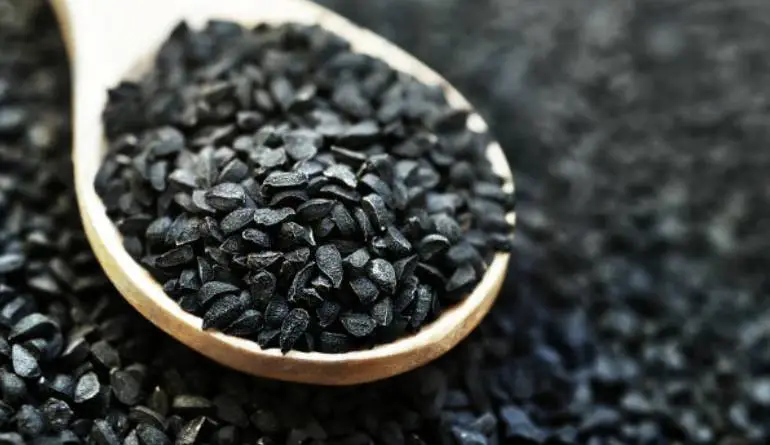Introduction
Karunjeeragam, also known as black cumin seeds or Nigella sativa, is an ancient spice that has been used for centuries in traditional medicine and cooking. Known for its strong aroma and slightly bitter flavor, Karunjeeragam has been praised for its medicinal properties and health benefits. It is often referred to as “the seed of blessing” and is widely used in Indian, Middle Eastern, and African cuisines. In this post, we’ll explore the history, health benefits, and culinary uses of Karunjeeragam, as well as why it deserves a spot in your kitchen.
What is Karunjeeragam?
Karunjeeragam, or black cumin, comes from the seeds of the flowering plant Nigella sativa. These tiny, black seeds are packed with flavor and are commonly used in spice blends, curries, and traditional remedies.
Often confused with regular cumin seeds (jeera), black cumin has a more pungent and peppery flavor. It is native to South Asia, the Middle East, and North Africa, and has been used in various forms of traditional medicine for thousands of years. The seeds are rich in bioactive compounds, making them a powerhouse of health benefits.
Historical Significance of Karunjeeragam
Karunjeeragam holds a significant place in history. It was famously mentioned in ancient Egyptian texts and was even found in King Tutankhamun’s tomb, symbolizing its importance in ancient civilizations. In Islamic tradition, the Prophet Muhammad is said to have referred to Karunjeeragam as a cure for “every disease except death.”
Traditional medicine systems like Ayurveda and Unani have long recognized the healing properties of Karunjeeragam. It has been used to treat a variety of ailments, from digestive issues to respiratory problems, and continues to be a vital ingredient in natural remedies today.
Health Benefits of Karunjeeragam
- Rich in Antioxidants:
Karunjeeragam contains powerful antioxidants, including thymoquinone, which helps fight oxidative stress in the body. This reduces inflammation and protects cells from damage caused by free radicals.
- Boosts Immunity:
The bioactive compounds in black cumin seeds help strengthen the immune system, making it more effective in fighting infections and diseases.
- Supports Digestive Health:
Karunjeeragam is known to aid digestion by stimulating the production of digestive enzymes, reducing bloating, and easing indigestion. It also acts as a natural remedy for gas and constipation.
- Respiratory Health:
Karunjeeragam has been traditionally used to treat respiratory issues such as asthma, bronchitis, and congestion. The seeds help to relax bronchial muscles, making breathing easier.
- Regulates Blood Sugar Levels:
Studies suggest that black cumin seeds may help in regulating blood sugar levels, making it beneficial for those with diabetes or those at risk of developing the condition.
- Promotes Heart Health:
Karunjeeragam is known to help lower cholesterol levels and blood pressure, reducing the risk of heart disease. It also helps improve overall blood circulation.
- Weight Loss Aid:
Black cumin seeds can help in managing weight by boosting metabolism and reducing appetite. Its thermogenic effect helps burn fat more efficiently.
- Skin and Hair Health:
The anti-inflammatory and antimicrobial properties of Karunjeeragam can improve skin conditions such as acne, eczema, and psoriasis. It is also used in hair care to combat dandruff and promote hair growth.
Culinary Uses of Karunjeeragam
Karunjeeragam is a versatile spice that can be used in a variety of dishes. Here are some ways to incorporate it into your cooking:
- Spice Blends:
Black cumin is often used in spice blends like panch phoron (a five-spice mix from Bengal) and garam masala. It adds depth and a slight bitterness to these blends.
- Curries and Stews:
Karunjeeragam is an excellent addition to curries, lentil dishes, and stews. Its strong flavor pairs well with rich, hearty dishes, especially those containing lamb, chicken, or beans.
- Baking:
Sprinkle Karunjeeragam on flatbreads like naan or parathas for added flavor and texture. It’s also used in certain bread recipes, particularly in Middle Eastern and North African cuisines.
- Pickles and Chutneys:
The seeds are often used in pickling, where their strong flavor complements the sourness of pickled vegetables. They can also be added to chutneys and relishes.
- Tea and Infusions:
Karunjeeragam is often steeped in hot water to make a soothing tea, which is known for its digestive and respiratory benefits.
- Yogurt and Salads:
Toast the seeds lightly and sprinkle them over yogurt, salads, or roasted vegetables for a unique flavor and crunch.
How to Use Karunjeeragam for Health Remedies
- For Digestion:
Chew a few seeds after meals or add them to warm water with a spoonful of honey to aid digestion and prevent bloating.
- For Respiratory Health:
Make an herbal tea by boiling Karunjeeragam in water, straining, and drinking it to relieve cough and cold symptoms.
- For Skin Care:
Mix black cumin seed oil with honey and apply it as a face mask to combat acne and skin inflammation.
- For Hair Growth:
Massage black cumin seed oil into your scalp to promote hair growth and reduce dandruff.
- How to Store Karunjeeragam
To retain the flavor and potency of black cumin seeds, store them in an airtight container in a cool, dark place. Avoid exposure to sunlight and moisture, as this can cause the seeds to lose their flavor and effectiveness over time. You can also store the seeds in the refrigerator to prolong their shelf life.
Conclusion
Karunjeeragam, or black cumin seeds, is a small but mighty ingredient packed with health benefits. From boosting immunity and improving digestion to enhancing the flavor of your favorite dishes, Karunjeeragam is a must-have in any kitchen. Whether you’re using it as a spice or incorporating it into your health routine, this ancient remedy offers a wealth of natural goodness that can benefit your body and mind.
Start experimenting with Karunjeeragam in your recipes and daily routine—you’ll be surprised at the big difference these little seeds can make!


